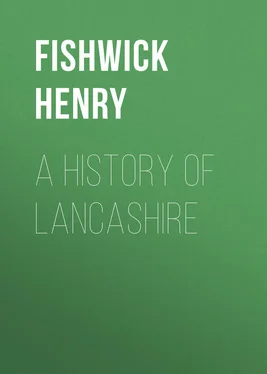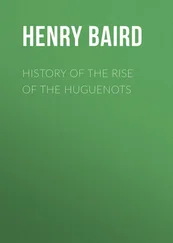Henry Fishwick - A History of Lancashire
Здесь есть возможность читать онлайн «Henry Fishwick - A History of Lancashire» — ознакомительный отрывок электронной книги совершенно бесплатно, а после прочтения отрывка купить полную версию. В некоторых случаях можно слушать аудио, скачать через торрент в формате fb2 и присутствует краткое содержание. Жанр: foreign_antique, foreign_prose, на английском языке. Описание произведения, (предисловие) а так же отзывы посетителей доступны на портале библиотеки ЛибКат.
- Название:A History of Lancashire
- Автор:
- Жанр:
- Год:неизвестен
- ISBN:нет данных
- Рейтинг книги:4 / 5. Голосов: 1
-
Избранное:Добавить в избранное
- Отзывы:
-
Ваша оценка:
- 80
- 1
- 2
- 3
- 4
- 5
A History of Lancashire: краткое содержание, описание и аннотация
Предлагаем к чтению аннотацию, описание, краткое содержание или предисловие (зависит от того, что написал сам автор книги «A History of Lancashire»). Если вы не нашли необходимую информацию о книге — напишите в комментариях, мы постараемся отыскать её.
A History of Lancashire — читать онлайн ознакомительный отрывок
Ниже представлен текст книги, разбитый по страницам. Система сохранения места последней прочитанной страницы, позволяет с удобством читать онлайн бесплатно книгу «A History of Lancashire», без необходимости каждый раз заново искать на чём Вы остановились. Поставьте закладку, и сможете в любой момент перейти на страницу, на которой закончили чтение.
Интервал:
Закладка:
The number of writs of pardon for trespasses against the forest laws, which are still preserved amongst the duchy records belonging to the thirteenth and fourteenth centuries, suggest that the offender had to purchase his pardon. The religious men, as they were called, and the clergy often had granted to them the right to hunt in the forests, as well as other privileges. As an example of the latter may be named the grant made in 1271 by Edmund Crouchback to the Prior and monks of St. Mary’s of Lancaster, to the effect that they might for ever take from the forests in Lancaster, 76except in Wyresdale, two cartloads of dead wood for their fuel every day in the year, and have free ingress and egress into the forest with one cart for two horses, or with two carts for four horses, to seek for and carry such wood away. Gradually, as the population increased, and as the personal interest of the Dukes of Lancaster in the forests themselves became less, many of these old forest laws fell gradually into disuse; but as late as 1697 a royal warrant was issued to the foresters and other officers of the forests, parks, and chases of Lancashire, calling upon them to give annually an account of all the King’s deer within the same, and also to report how many were slain, by whom, and by whose authority.
The regulations as to fishing in the rivers of the county were not so comprehensive as the forest laws; but the value of various fisheries was fully recognised, and they became a source of revenue. In 1359 Adam de Skyllicorne had a six years’ lease of the fishing in the Ribble at Penwortham, with the demesne lands, for which he paid six marks a year, and in the succeeding year justices were assigned to inquire into the stoppages of the passages in the same river, by which the Duke’s fishery of Penwortham was destroyed and ships impeded on their way to the port of Preston. Fishing in the sea as a trade also met with encouragement, for in A.D. 1382 a precept was issued to the Sheriff to publish the King’s mandate, prohibiting any person in the duchy who held lands on the coast from preventing fishermen from setting their nets in the sea and catching fish for their livelihood; and in 13 Richard II. (1389–90) an Act was passed appointing a close time for salmon in the Lune, Wyre, Mersey and Ribble.
Notwithstanding that the fishing rights on both sides the Ribble had been leased or sold with the demesne lands, nearly 200 years later the King still claimed all manner of wrecks and fish royal which were cast upon the shore. On this point a suit in the duchy court appeared in 1536, in which the King’s bailiff charged one Christopher Bone with having taken away sturgeon and porpoises which had been washed ashore at Warton, in the parish of Kirkham, whereas they of right belonged to his Majesty. 77It may be noted that at this time the porpoise was considered “a dainty dish to set before the King.”
The Normans did not, as has been frequently stated, introduce that dreadful disease, leprosy, into England, as there were hospitals set apart for leprosy at Ripon, Exeter, and Colchester some time before their advent. In the twelfth and thirteenth centuries leprosy was very prevalent in the northern parts of Lancashire; and to meet the requirements a hospital was founded at Preston in the time of Henry III. How the lepers who were not in the hospitals were dealt with we have no evidence to show, but that they were harshly, not to say cruelly, treated, and were in a measure outcasts, may be safely assumed.
Shortly before April 10, A.D. 1220, Henry III. addressed a letter to Hubert de Burgh, instructing him to order the Sheriff and forester of Lancaster to desist from annoying the lepers there; 78and this not proving efficient, a royal writ was issued to the Sheriff (dated April 10) directing that officer to see that they were no longer molested by Roger Garnet and others, and that henceforth they were to have their beasts and herds in the forest without exaction of ox or cow, and also to be allowed to take wood for fuel and timber for building.
From this it appears clear that these lepers lived apart from the rest of the community, in houses or huts erected by themselves, and were not allowed to enter even a church; hence the use of what are known as leper windows, one of which still remains in the north chancel wall of Garstang Church. Leprosy continued with great severity for upwards of a couple of centuries, but towards the time of Henry VIII. it appears to have gradually decreased, and in the days of his immediate successor had almost died out.
The various Crusades of the twelfth century found many followers from Lancashire, and even when the Christians were fast losing their Asiatic possession it was thought worth while to appeal to this county for help, as we find, in June, 1291, the Archbishop of York instructing the Friars there to send three Friars to preach on behalf of the Crusades; one was to address the people at or near Lancaster, another at some place convenient for the Lonsdale inhabitants, and a third at Preston, in such a locality as it was believed the greatest congregation could be got together. 79
The history of the wars between England and Scotland is a page of the general history, but it will be necessary here to state that in 1290 there were thirteen claimants to the Scottish crown, and this led to the beginning of the “Border warfare” between the people on the two sides of the Solway Firth, the Cheviots and the Tweed. Edward I., taking advantage of the position, put in a claim to the Scottish throne, and afterwards took possession as suzerain of the disputed feudal holding.
In 1292 Baliol was appointed King of Scotland with the consent of Edward I., to whom, however, homage had to be done, and out of this right of appeal, thus claimed by the King of England, arose that long series of wars between the two kingdoms which began in the early part of the year 1296, when Edward crossed the Tweed with an army of 12,000 men.
These wars were a great tax upon Lancashire, as, besides being subject to constant invasions, and bearing its share of the subsidies, from it were drawn from time to time large numbers of its bravest and best men. In 1297 Lancashire raised 3,000 men, and at the battle of Falkirk, in the vanguard, led by Henry de Lacy, Earl of Lincoln, there were 1,000 soldiers from this county. Another 1,000 foot soldiers were raised in 1306, and this constant drain continued for many years. After the battle of Bannockburn in 1314, the victorious Bruce besieged Carlisle, but after a long struggle he was obliged to retire, the commander of the castle, Sir Andrew de Harcla, as a recognition of his gallant services, receiving from the King the custody of Cumberland, Westmorland and Lancashire. 80Within a very few years, on a charge of treason, he was hung, drawn and quartered at Carlisle, one of the pleas raised against him being that he had allowed Bruce to pass into Cumberland and Lancashire, where his army had plundered and marauded in every direction; this was in July, 1322.
In the second half of this century we find several levies made upon Lancashire for soldiers to march against the Scots, but after this the county was not subjected to the frequent invasions with which its inhabitants had been too long familiar. The most serious of these invasions was the one in July, 1322, and of the effects of this and other raids we have an authentic record in the Nonarum Inquisitiones , taken (for North Lancashire) in 15 Edward III. (A.D. 1341). The commission appointed to levy this tax on the corn, wool, lambs, and other tithable commodities and glebe lands, were specially instructed to ascertain the value in 1292 (Pope Nicholas’ Taxation), and the then value, and where there was a material difference between the two, they were to ascertain the reason of such increase or decrease. They reported that at Lancaster much of the land was now sterile and uncultivated through the invasions of the Scots, that Ribchester and Preston had almost been destroyed by them, and that at the following places the value of the tithes was very seriously reduced through the same agency, viz., Cockerham, Halton, Tunstall, Melling, Tatham, Claughton, Walton, Whytington, Dalton, Ulverston, Aldingham, Urswick, Pennington, Cartmel, Kirkham, St. Michael’s–on–Wyre, Lytham, Garstang, Poulton, Ribchester and Chipping; except the two latter, all these are in Amounderness, and north of the Ribble; into none of the other parts of the county do the Scots appear to have penetrated. In some cases the reduction amounted to something like fifty per cent.; in fact, the invaders must have set fire to buildings and laid waste the land all along their line of march.
Читать дальшеИнтервал:
Закладка:
Похожие книги на «A History of Lancashire»
Представляем Вашему вниманию похожие книги на «A History of Lancashire» списком для выбора. Мы отобрали схожую по названию и смыслу литературу в надежде предоставить читателям больше вариантов отыскать новые, интересные, ещё непрочитанные произведения.
Обсуждение, отзывы о книге «A History of Lancashire» и просто собственные мнения читателей. Оставьте ваши комментарии, напишите, что Вы думаете о произведении, его смысле или главных героях. Укажите что конкретно понравилось, а что нет, и почему Вы так считаете.












